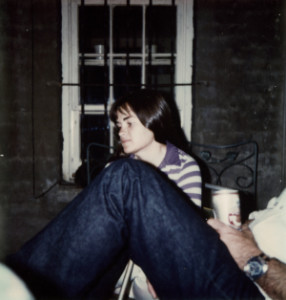When I taught at City University of New York in the seventies, I had a student who used to tell me not to eat chicken. I don’t recall the specifics, except that it wasn’t about cruelty to animals. It had to do with what chickens were fed (probably antibiotics and hormones) and what we consequently ended up eating ourselves. I didn’t stop eating chicken at the time, but I find it curious that I still remember the intensity of that student’s convictions. In retrospect, I think it was one of those “something’s happening here” moments, when you know something important is going on, but you can’t quite put your finger on it.
The problem is you

I see now that Dyer’s book reflected a change in political, economic, and social thinking that was happening in the seventies. The Problem Is You attitude turned out to be a major player in the creation of the health culture. The message was: You are personally responsible for your health, and you can determine your health by living a “healthy lifestyle.” Control over your life became a necessary condition for self-worth.
I was anxious in the seventies, without knowing why. And I was so annoyed by the Dyer book that I wrote “Don’t Worry:” Understanding Anxiety. I wrote it both to vent my annoyance and to understand more about anxiety.
My research reading led me to authors such as Alfred Schutz, Peter Berger and Thomas Luckmann, and Karl Mannheim. I was struck by the concepts of the taken-for-granted nature of the world, the stock of knowledge we inherit, the limitations imposed on our conceptions and even our perceptions by the very language we speak, as well as by the time and culture into which we’re born. These ideas resonated with me at a very deep level. They seemed to offer a means to wake up and escape from the unquestioned dream of life.
Victims of advice
I didn’t quite manage to wake up when it came to my own anxiety about matters of health. Over the intervening decades I found myself impacted – like most middle-class Westerners, I assume – by the media’s barrage of information on health, fitness, and psychological self-help. I was concerned with what to eat and what not to eat, should I take supplements, am I exercising enough, and is it OK not to be “normal.”
I used to think it was my tendency to be anxious that made me vulnerable to all this information. I was a “victim of advice,” even though I’d identified that particular ploy in my book on anxiety. I was always vaguely troubled and ambivalent about my attraction to alternative health and fitness practices. Did it come from an inner sense of knowing what was really good for me? Or was I simply influenced by increased publicity and advertising telling me I should be anxious about my health because there were so many risks and, correspondingly, so many things I should be doing to protect myself?
What was happening in the seventies was a fundamental change in assumptions about health and wellness. Since I was surrounded by people who were all subject to the same media influences, my own increase in health awareness was nearly invisible to me – like the frog in hot water who doesn’t notice the temperature is life-threatening until it’s too late.
But in retrospect I feel I should have known better. I had taught the history of medicine in the seventies, and I enjoyed disabusing naïve students of the idea that science provides certainty and unchanging truth. And there were plenty of clues to what was going on. All of a sudden there were all those self-help books on the best-seller list, Psychology Today and Prevention magazines, Yoga Journal, Ronald Reagan, neo-liberalism, and the end of the Great Society.
Healthism and the medicalization of everyday life
When I came across the idea of healthism in an article by Robert Crawford, I woke up. I started wondering: How did we end up living in a world where there is so much information on health (much of it contradictory from one day to the next), where we feel personally responsible for our health, where we blame our own poor “lifestyle” habits if we get sick, where we judge the health lifestyles of others and are so proud of our own healthy habits?
I’m old enough to remember that it wasn’t always like this. I was born before jogging was fashionable and the Surgeon General’s report on smoking. A doctor once came to my house when I had childhood measles. If you became conscious – that is, if you became aware of the world outside your family – after the seventies, you might not know that things were ever different from the way they are now.

I don’t have any answers. I doubt I’ll even come up with any profound insights. But this is what I want to spend my time thinking about. I’d like to share my journey with anyone else who finds this subject matter as interesting as I do. I heartily welcome reader contributions.
Related posts:
The problem is you
Healthy lifestyles serve political interests
The tyranny of health
Negative knowledge: Remembering Alfred Schutz
Sources:
Robert Crawford, Healthism and the medicalization of everyday life, International Journal of Health Services 1980; 10(3):365-88
Alfred Schultz and Thomas Luckmann, The Structures of the Life-World
Peter Berger and Thomas Luckmann, The Social Construction of Reality
Karl Mannheim, Ideology and Utopia


Amen to all that, Jan. I think you’ve already come up with some profound insights by recognizing what so many people are unaware of. I believe it was CS Lewis who said, ‘We read to know we are not alone.’ If people like you don’t question this stuff, then we’ll all be sleepwalking into a system run by an unholy combination of governments and the pharmaceutical industry.
Well said Kate – the unholy combination of government and big pharma. I’m so glad to have met someone who shares my passion about this subject.
It’s been over two years since I wrote this post. What I’ve discovered through blogging is how much I care about the things that incense me.
(See Kate’s guest post on this subject at Guest post: A fat lot of good.)
Hi Jan,
I’ve just discovered your blog via twitter.
Your thoughts really resonate with much of what I think about health and public health, and my concerns around the unrelenting focus on personal responsibility, tied in with free market philosophies and individualism. I look forward to reading more of your work!
Hi Danielle – Thanks for your comment. Are you the Danielle Couch on Twitter – public health researcher, PhD student, segmented sleeper in Australia? I hadn’t heard of segmented sleep. Just looked it up. That would really work for me. Thanks again. :-)